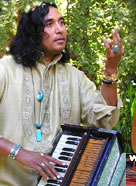 |
||||||
 |
||||||
 |
||||||
CLOTHESLINE
REVIVAL INTERVIEWS
A Conversation with Sukhawat Ali Khan
Sukhawat Ali Khan: Hello my friend. So good to hear from you.
Puremusic: Thank you very much. And it’s a beautiful pleasure to meet Sachiko Kanenobu as well. [Sachiko had answered the phone and I took the opportunity to tell her how much we’d enjoyed her vocals on Receive and to ask about her own records.]
SAK: Ah yes. She is a great, awesome artist. I did a tour with her to Japan recently and we had a great time.
PM: When you played Japan with her, were you supporting act for her or were you both doing your thing together or…?
SAK: I was supporting. She made a CD, and I was on it.
PM: Let’s begin by talking a little about the musical tradition in your family and where that started.
SAK: Our family background is: several hundred years ago, my ancestor was the court musician for Akbar the Great, the greatest king in India. And at that time, all kinds of fine arts were at their peak, painting and calligraphy and poetry–and music, of course. Music was one of the most important things. So this music I sang on Conrad’s CDs, on Receive and this new one [Of My Native Land], is actually based on the music created by, you know, great personalities of the past.
PM: It’s amazing to see the tradition that you come out of transformed in this modern way, not only in your collaborations with Conrad and Robert, but also in the Ali Khan Band as well. That’s got to be an explosive, dynamic outfit live, does it not?
SAK: Ah yeah, it is. The music is in our family, as I mentioned. The music is traditional music, but always transforming. I believe the world is a melting pot, and one way this melting should happen is through the music. If we can say something with the music, even if we speak a different language, the music has energy. The energy has a power that we can see. If Bob Marley says, [sings] "Get up, stand up… Stand up for your rights…" and if he sings it with rhythm and melody, it’s so good and everybody is following it and feeling it. But if somebody says, [talks flatly] "Get up. And stand up."–if somebody talks like that, it is the same message but…it affects less, you know?
PM: Absolutely.
SAK: So the transforming… When I came to the United States–long time ago, in the 80s–my father, Ustad Salamat Ali Khan, was a great classical Indian artist, a Pakistani artist. He teaches me all the music tradition, but also he teaches me this: "You are going there, it is your duty to learn." All this new learning is a cool thing to him. And then I came here, and I saw a different kind of music. In New York I went to reggae concerts, and rock. Jazz and pop. Everything. And I try to understand it all. But in fact, what I find deep inside all kinds of music–fusion jazz or whatever it is–in it is a melody and a rhythm. You try to understand a song, you try to become a song, and simple or difficult, inside you find melody and rhythm. But what makes it cool is a feeling, made by any artist who is able to create feeling. The way they use it, that is what is so beautiful. African music, and Arabic music, and Latino music–I was very lucky to study all of them, and then try to blend it all in the Ali Khan Band. Ali Khan Band is now Shabaz. We changed the name because there are a lot of Ali Khans out there. [laughs]
PM: Ah yes, Shabaz.
SAK: I am very happy at being transformed from just a traditional musician–but still put the tradition into modern funk, jazz, rock. All kinds of stuff, we love it, you know? That’s why it’s easy to work with such a beautiful artist like Conrad, because he also feels this way about the tradition and the transformation.
PM: How did you meet Conrad?
SAK: I met Conrad through Robert. Robert Powel is my great friend, he’s like my brother. And also Conrad. Both are great artists. A long time ago, maybe in the 90s, Robert Powell played with my father. They did some recording in Santa Barbara. I came to the Bay Area and my father gave me Robert’s number, that’s how we connected. Then we started working. We did a lot of work together, some recordings, and we’re still doing it. And of course Robert knows Conrad. When Conrad was making Receive, Robert told him about me.
PM: Man, that must’ve blown Conrad’s mind when Robert Powell introduced you to him.
SAK: [laughs] Yes. And as soon as we met, we just connected: the energy was the same, and Conrad really loved me and I love him too, and somehow whatever we create we just become it. Somehow God, or whatever, makes such a beautiful music through that meeting, you know?
PM: Yes. continue
jump to:
Wendy Allen Tom
Armstrong Robert Powell
Conrad Praetzel
puremusic archives puremusic home